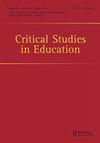Filling gaps: assessment software and the production of mathematics and its teaching and learning in primary schools
IF 2.7
2区 教育学
Q1 EDUCATION & EDUCATIONAL RESEARCH
引用次数: 3
Abstract
ABSTRACT Recent policy reforms to the national assessment system in England have altered the way in which teachers undertake assessment. Through an analysis of data from a small-scale interview study with eleven primary teachers in the south and east of England, we examine the ways in which teachers work with assessment software to monitor and track attainment. By employing a theoretical lens focusing on power and implementing an analytics of government, we illuminate the visualising effects of whole-class digital assessment grids. A prominent feature across the data set is the use of the language of ‘gaps’ in relation to the teaching and assessment of mathematics. We argue that digital assessment tools act as technologies of power and of the self which shape teachers’ practices, their identities, how they position children as learners, but also shape the nature of the subject of mathematics itself. It is important to better understand assessment software in education and the discourses in which it operates in order to recognise what is at stake for teaching, learning and curriculum.填补空白:评价软件与小学数学生产及其教与学
最近英国国家评估体系的政策改革改变了教师进行评估的方式。通过对英格兰南部和东部11名小学教师进行小规模访谈研究的数据分析,我们研究了教师使用评估软件监控和跟踪成绩的方式。通过采用专注于权力的理论镜头和实施政府分析,我们阐明了整个班级数字评估网格的可视化效果。整个数据集的一个突出特征是使用与数学教学和评估相关的“差距”语言。我们认为,数字评估工具作为一种权力技术和自我技术,塑造了教师的实践、他们的身份、他们如何将儿童定位为学习者,同时也塑造了数学学科本身的性质。为了认识到教学、学习和课程的利害关系,更好地理解教育中的评估软件及其运作的话语是很重要的。
本文章由计算机程序翻译,如有差异,请以英文原文为准。
求助全文
约1分钟内获得全文
求助全文
来源期刊

Critical Studies in Education
EDUCATION & EDUCATIONAL RESEARCH-
CiteScore
10.10
自引率
5.10%
发文量
18
期刊介绍:
Critical Studies in Education is one of the few international journals devoted to a critical sociology of education, although it welcomes submissions with a critical stance that draw on other disciplines (e.g. philosophy, social geography, history) in order to understand ''the social''. Two interests frame the journal’s critical approach to research: (1) who benefits (and who does not) from current and historical social arrangements in education and, (2) from the standpoint of the least advantaged, what can be done about inequitable arrangements. Informed by this approach, articles published in the journal draw on post-structural, feminist, postcolonial and other critical orientations to critique education systems and to identify alternatives for education policy, practice and research.
 求助内容:
求助内容: 应助结果提醒方式:
应助结果提醒方式:


